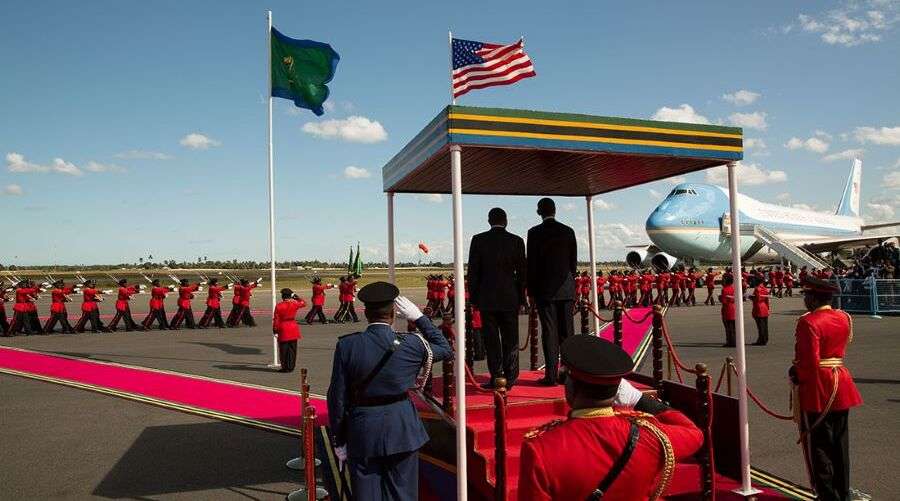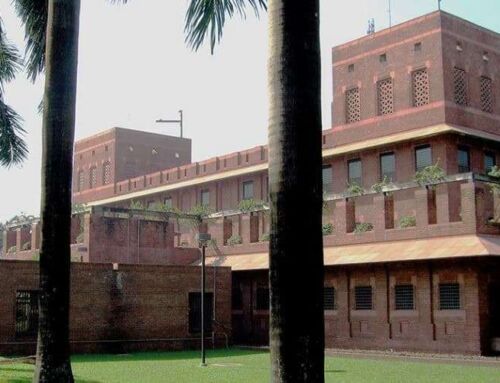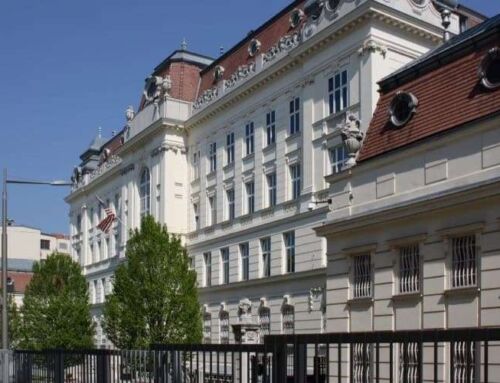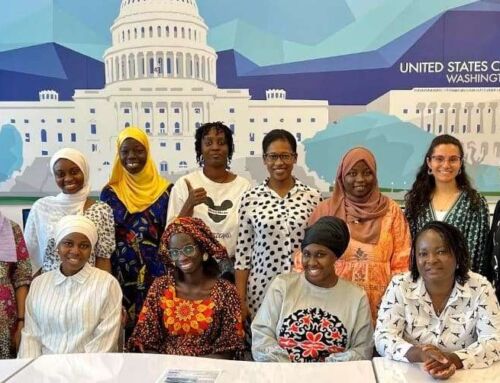In this Q&A interview, Jim Hazeltine-Shedd talks about how the IT role in the Foreign Service is changing – which will give you the opportunity to make a mark early on in your career. The role is becoming more outwardly focused, engaging with frontline diplomats and putting tech solutions in their hands so they can get their jobs done. Since this interview, the Information Management Specialist (IMS) role has evolved into the Diplomatic Technology Officer (DTO) role. Jim joined the Foreign Service as an IMS in 2021. He is currently enterprise coordinator in the Bureau of Information Resources Management at the U.S. Department of State. You can also view his video interview here.
Where was your first post as an Information Management Specialist (IMS), and what were your responsibilities there?
My first post was Lusaka, Zambia. So I joined halfway through my wife’s tour in Quito, so we spent a year with her in Quito, Ecuador and me in Lusaka, Zambia. And in case you’re wondering no there are no direct flights between Ecuador and Zambia – go figure. When I arrived, the post was fully staffed. As a three-person office, we had an IMO [Information Management Officer], an IMA [Information Management Assistant], and me as the first tour IMS in the IPC [Information Program Center]. Locally employed staff worked in the ISC [Information Service Center]. But in the first three or four months, the IMA and the IMO both left, and the incoming IMO broke his assignment. So I ended up as the acting IMO for a post in Africa with probably about 400 people for about six months. It was drinking from the fire hose that first tour – I did everything. I oversaw the ISC, ran all the IPC operations, did the class pouch, and oversaw the phones. I was working 12-hour days and I learned a lot in that first tour. Things that really have stood me in good stead, such as how to develop a job description to submit to the ICASS council at a post to get new staff. I chaired the technical evaluation panel and selected the internet service provider for the embassy, which was an eight million dollar contract.
It was a lot of things that I got to do that were sort of stretches for a brand new IMS. If you get sent to a smaller post in Africa, you might expect something like that. It can be tough, but you will learn a lot. You certainly get to assume a lot of responsibilities and have a much kind of higher profile at that kind of post. Simply by walking off the plane in Zambia and having a master’s degree in computer science, I became one of the top IT experts in the country, and that’s pretty cool.
Do you get a choice of where you might be posted?
For the first two tours, no, you don’t have a whole lot of say. But after that, yes, you have to bid and the bidding process is sort of like applying for a job, but you just happen to be applying for jobs that are inside the State Department. So you put together a resume, you do interviews, you do all the things you need to do. The first two assignments are directed, so they [State Department] just say go there. But, at least in my day, if your first post had a high amount of what they call “differential hardship,” you got bumped up the list for your second tour and they would ask you your choices. You could rank order your choices, but they are not bound by your rank-ordered selection. They do try to add some sort of equity into it so that if you’re in Banjul the first tour, you don’t end up in another small post in Africa for the second tour.
Where did you go for your second tour?
In my case, my second tour was Paris. So the equity that I had from Zambia served me in good stead. After two years Lusaka, we ended up doing a tour in Paris. Paris was fantastic. I actually had French from high school and college, and my wife is, as you might expect from a foreign service generalist, somewhat of a wizard with languages. She was able to pick it up and she ended up on leave without pay for two years in Paris. I think she saw 74 museums. We attended wine tasting classes at the Cordon Bleu, we had membership at the Louvre – it was quite wonderful.
What was your most memorable experience in your IT role that supported diplomacy?
That would have to be supporting the presidential visit in Dar Es Salaam, which was during President Obama’s presidency. He came down to Dar Es Salaam to announce a major power initiative for the continent. The United States would be building power generators throughout the continent. At the same time, there was a First Ladies conference happening as well. My duty, basically, was to implement all of the requirements of the White House communications office at the hub hotel. When the president goes into a country like that, they basically take over a hotel. The Secret Service and the White House communications folks send you an extensive list of requirements ahead of time. They are very clear about their requirements, and they need things done on a tight timeline. My responsibility was the hub hotel, but I got together with the IT guy from the hub hotel, and we were running cable in the plenum space, drilling holes through walls. I installed a couple of internet connections for Sasha and Malia’s Disney Plus in the presidential suite. It was 16 hour days for three, four weeks, gearing up for that visit.
There was this one patch panel in the hotel where we had re-patched everything and there were so many cables bulging out of it that you couldn’t close the door on the patch panel without it causing some of the cables to pop out. So part of what I did on game day was to put a big sign on it saying “do not close this door.” I had to be checking that door throughout the day to make sure nobody closed it, because if they did, like three White House communication services were going to go down. It was unbelievably cool.
The IMO at the time basically just kind of handed me the hotel and said this is your responsibility. The team that I led was hotel contractors. These are guys that did not speak English, so we communicated through sign language. The only English that they really spoke was the English I taught them, which was to say “on time and under budget.” I’d take them to a room and show them the things that I needed done, and they’d nod their heads. I’d say “on time and under budget,” and they’d say “on time and under budget.”
So it was a pretty cool responsibility. It was a lot of work and challenging, but also really neat to be able to be providing a direct service to the president that way. The White House communications staff actually got me into his keynote address. They handed me a little earbud that was connected to nothing at all, and they said, wear a blazer and stand in the back with that little earbud. So I was standing there with all the leadership of Africa, with President Obama 10-20 feet away from me, and First Lady Michelle Obama standing right next to me. I got to meet him afterward and shake his hand. So it was a really neat experience.
Do you have any advice for those who are applying for the Foreign Affairs IT (FAIT) Fellowship program?
The prototypical information management specialist in the past has tended to come from a very specific background with military experience. They tend to be Navy comm or Air Force comm guys who have done a number of tours. When they join the foreign service, they can roll their military time into foreign service time, and they get all kinds of perks and benefits from that. The military guys are great – they’re highly skilled, they contribute a lot, and they’ve got a great work ethic. So what I would say to students applying for the FAIT Fellowship is that we need folks who actually are outside that box. I think that, increasingly, the job of an IT professional is less focused on the back end, less focused on the hardware. We’re in a cloud world now, so a lot of the services that typically have belonged to an IT specialist in the past are going somewhere else. They’re going to a data center somewhere. In my view, this role [as a DTO in Foreign Service] is going to be more outwardly focused, engaging with the frontline diplomats and helping them by putting technology solutions in their hands so that they can get their jobs done, rather than just making sure that the switches are configured correctly. Some of that isn’t going to go away, but a lot of it is. The skillset that is going to be demanded of DTO down the line is going to be much more focused on being able to bridge the connection between the technology and the user – to be the kind of conduit or bridge. And that demands communication skills and writing skills, project management skills that are different than some of the network admin, sys admin, and hard skills that have been called upon in the past. So it’s a job that’s changing and I would say that you are going to have the opportunity fairly quickly in your career to make a mark.
I’ll give you an example. My third tour was back at the Foreign Service Institute. And in 2016, IRM published a 200-300 page study talking about this transition – as we move to the cloud, what is the role of an IMS. And, because of my background in education, I was tasked with designing the curriculum to prepare IMS’s to make this transition. As a third tour IMS, I was developing a curriculum that the Dean of the school called the most important curriculum she thought that the school offered. As a first tour IMS, I wrote an 8 million dollar contract for the internet connection at the embassy and I got to serve on a Presidential visit. There are ways to be impactful and to use your skills. So don’t come into this thinking that you absolutely must be the most brilliant technology person ever. There are other skills that you can bring to the table that the job needs. Simply because you don’t know all the ins and outs of PowerShell, don’t let that deter you. There are other ways to make a contribution, and the kind of tagline about IMS’s is we’re “a jack of all trades, master of none.” And “all” is really capitalized, A-L-L, all. I did not think I would be using curriculum development skills when I took a job as an IMS, yet here I am doing it. So there’s no telling what or how the job will draw out the skill sets that you bring to it.
Youth, energy, different perspectives – all of these are what FAIT Fellows can bring to the table. From the FAIT Fellows that I’ve talked to and trained actually and worked with, I’ve been unbelievably impressed and just thrilled that they’re interested in the Foreign Service as a career. So do I have any advice? No, I would have a plea. Come join us because we can really use your energy, your vitality, your innovation, your perspectives. And I think that you’ll find most DTOs share that point of view.
Photo credit: REUTERS / Alamy Stock Photo – Air Force One taxis on the runway as a Tanzanian military honor guard waits on the tarmac to take part in a welcoming ceremony in Dar Es Salaam.






